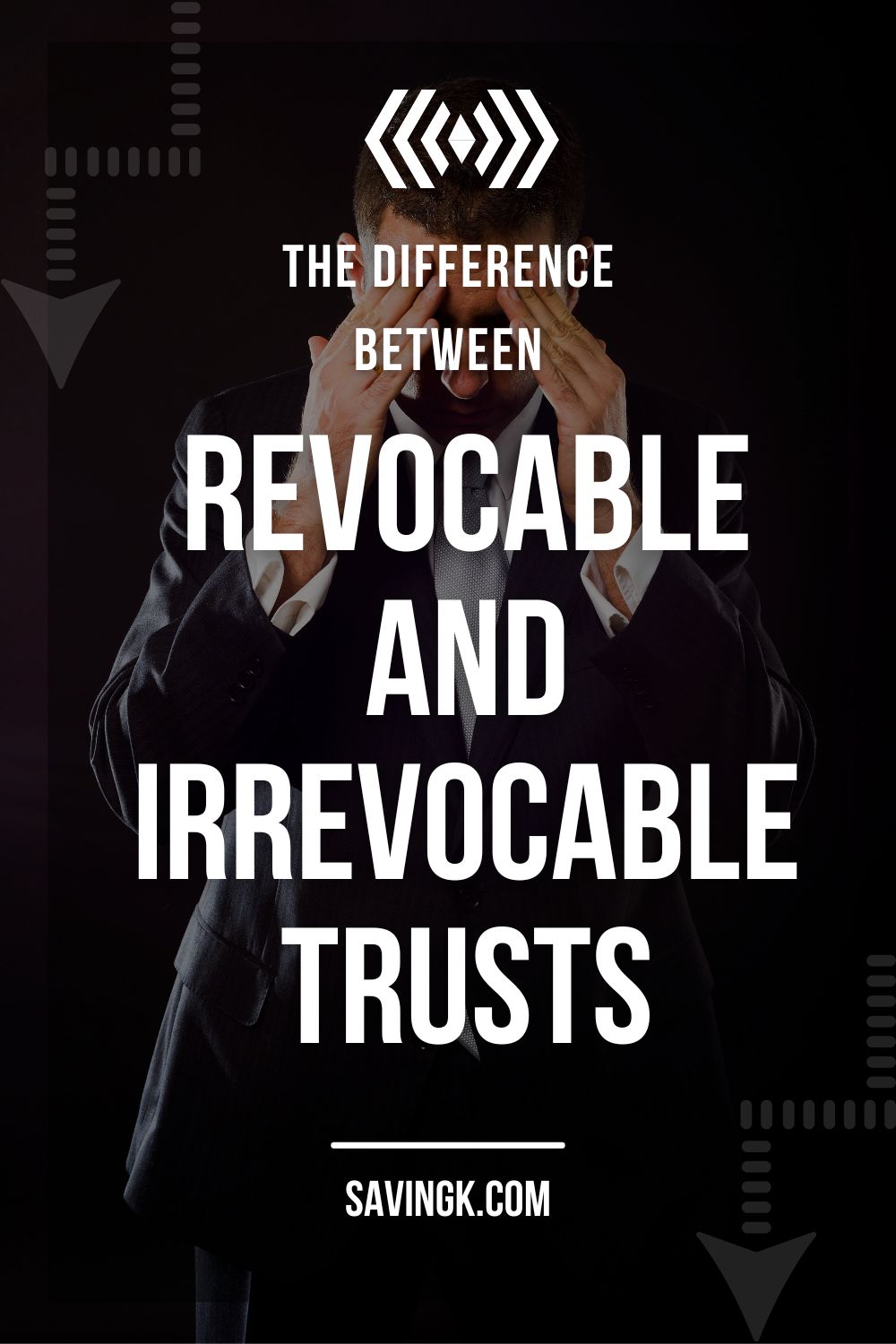
A trust is an arrangement in which one person, called the trustee, holds legal title to property for another person, called the beneficiary. There are two main types of trusts: revocable and irrevocable trusts. A revocable trust can be modified or terminated by the grantor at any time during his or her lifetime. An irrevocable trust, however, cannot be modified or terminated without the consent of the beneficiaries.
The main difference between revocable and irrevocable trusts is that a revocable trust can be changed by the grantor at any time, while an irrevocable trust cannot be changed once it has been created.
Contents
Revocable trusts
There are several advantages to having a revocable trust, also known as a living trust. First, the grantor retains control over the property during his or her lifetime. Second, the grantor can change the terms of the trust at any time. Finally, a revocable trust avoids probate because the property is transferred to the beneficiaries upon the death of the grantor.
Advantages of Revocable Trusts
Grantors retain control over their property: A revocable trust gives the grantor complete control over his or her assets during his or her lifetime. The grantor can modify or terminate the trust at any time, and can even revoke the trust completely if desired. This flexibility can be important if the grantor’s circumstances change, such as if he or she gets divorced or has a change in financial circumstances.
Disadvantages of Revocable Trusts
Assets in a revocable trust are still considered part of the grantor’s estate: Even though assets in a revocable trust are not technically owned by the grantor, they are still considered part of his or her estate for tax purposes. This means that the grantor’s estate will still be subject to estate taxes when he or she dies.
Irrevocable trusts
There are also several advantages to having an irrevocable trust. First, it can provide asset protection for the grantor from creditors and lawsuits. Second, it can minimize estate taxes. Finally, an irrevocable trust avoids probate because the property is transferred to the beneficiaries upon the death of the grantor.
Advantages of Irrevocable Trusts
Assets in an irrevocable trust are not part of the grantor’s estate: One of the biggest advantages of an irrevocable trust is that the assets in the trust are not considered part of the grantor’s estate for tax purposes. This can be a major advantage if the grantor is concerned about estate taxes, as it can help to reduce the amount of taxes that his or her heirs will have to pay.
Disadvantages of Irrevocable Trusts
Grantors cannot change their mind: Once an irrevocable trust has been created, the grantor cannot change his or her mind about it. This can be disadvantageous if the grantor’s circumstances change and he or she wants to modify the trust.
Trust FAQs
Here are some frequently asked questions about revocable and irrevocable trusts.
What is a revocable trust?
A revocable trust is an arrangement in which one person, called the trustee, holds legal title to property for another person, called the beneficiary. The grantor can modify or terminate the trust at any time, and can even revoke the trust completely if desired.
What is an irrevocable trust?
An irrevocable trust is an arrangement in which one person, called the trustee, holds legal title to property for another person, called the beneficiary. The grantor cannot modify or terminate the trust once it has been created.
What are the advantages of a revocable trust?
The main advantage of a revocable trust is that the grantor retains control over the property during his or her lifetime. The grantor can modify or terminate the trust at any time, and can even revoke the trust completely if desired.
What are the disadvantages of a revocable trust?
One disadvantage of a revocable trust is that the assets in the trust are still considered part of the grantor’s estate for tax purposes. This means that the grantor’s estate will still be subject to estate taxes when he or she dies.
What are the advantages of an irrevocable trust?
One of the biggest advantages of an irrevocable trust is that the assets in the trust are not considered part of the grantor’s estate for tax purposes. This can be a major advantage if the grantor is concerned about estate taxes, as it can help to reduce the amount of taxes that his or her heirs will have to pay.
What are the disadvantages of an irrevocable trust?
One disadvantage of an irrevocable trust is that the grantor cannot change his or her mind about it once it has been created. This can be disadvantageous if the grantor’s circumstances change and he or she wants to modify the trust.
What is the purpose of a revocable trust?
A revocable trust is an arrangement in which one person, called the trustee, holds legal title to property for another person, called the beneficiary. The purpose of a revocable trust is to give the grantor control over the property during his or her lifetime, while still avoiding probate.
What is the purpose of an irrevocable trust?
An irrevocable trust is an arrangement in which one person, called the trustee, holds legal title to property for another person, called the beneficiary. The purpose of an irrevocable trust is to give the grantor asset protection from creditors and lawsuits, and to minimize estate taxes.
Does Suze Orman recommend revocable trust?
There is no one-size-fits-all answer to this question, as it depends on the individual circumstances of the grantor.
Who owns the property in a revocable trust?
The grantor owns the property in a revocable trust during his or her lifetime. Upon the death of the grantor, the property is transferred to the beneficiaries.
Who owns the property in an irrevocable trust?
The trustee owns the property in an irrevocable trust. The grantor cannot change his or her mind about the trust once it has been created.
Can I write my own revocable living trust?
Yes, you can write your own revocable living trust. However, it is advisable to consult with an attorney to ensure that the trust is properly executed and that all applicable laws are followed.
Can I write my own irrevocable trust?
Yes, you can write your own irrevocable trust. However, it is advisable to consult with an attorney to ensure that the trust is properly executed and that all applicable laws are followed.
What happens if I die without a trust?
If you die without a trust, your assets will be subject to probate. Probate is a legal process through which your assets are distributed to your heirs.
What is the difference between a trust and a will?
A trust is an arrangement in which one person, called the trustee, holds legal title to property for another person, called the beneficiary. A will is a legal document that specifies how your assets will be distributed upon your death.
Can a trust be used to avoid probate?
Yes, a trust can be used to avoid probate. If all of your assets are held in a trust, they will not be subject to probate.
Can a will be used to avoid probate?
No, a will cannot be used to avoid probate. Probate is a legal process through which your assets are distributed to your heirs.
Do I need a lawyer to create a trust?
It is not required that you have a lawyer to create a trust. However, it is advisable to consult with an attorney to ensure that the trust is properly executed and that all applicable laws are followed.
Do beneficiaries pay taxes on revocable trust?
No, beneficiaries do not pay taxes on revocable trust. The grantor of the trust pays taxes on the income generated by the trust.
Do beneficiaries pay taxes on irrevocable trust?
No, beneficiaries do not pay taxes on irrevocable trusts. The grantor of the trust pays taxes on the income generated by the trust.
What is the difference between a living trust and a testamentary trust?
A living trust is an arrangement in which one person, called the trustee, holds legal title to property for another person, called the beneficiary. A testamentary trust is created by a will and only comes into effect upon the death of the grantor.
What are the tax advantages of a revocable trust?
The grantor of a revocable trust pays taxes on the income generated by the trust. The beneficiaries of the trust do not pay taxes on the trust income.
What are the tax advantages of an irrevocable trust?
The grantor of an irrevocable trust pays taxes on the income generated by the trust. The beneficiaries of the trust do not pay taxes on the trust income.
Is an EIN required for a revocable trust after death?
No, an EIN is not required for a revocable trust after death. The EIN is only required if the trust has any taxable income.
Is an EIN required for an irrevocable trust after death?
No, an EIN is not required for an irrevocable trust after death. The EIN is only required if the trust has any taxable income.
What assets should not be placed in a revocable trust?
Assets that should not be placed in a revocable trust include your home and your car. Assets such as your retirement accounts and your life insurance policies should NOT be placed in a revocable trust because they are already exempt from probate.
What assets should not be placed in an irrevocable trust?
Assets that should not be placed in a revocable trust include your car and your house. Assets such as your life insurance policies and retirement accounts shouldn’t be placed in a revocable trust because they’re already exempt from probate.
Why put your house in a revocable trust?
There are many reasons why you might put your house in a revocable trust. Some reasons include avoiding probate, protecting your assets from creditors, and managing your property if you become incapacitated.
Why put your house in an irrevocable trust?
There are many reasons why you might put your house in an irrevocable trust. Some reasons include avoiding probate, protecting your assets from creditors, and managing your property if you become incapacitated.
How do you amend a revocable trust?
You can amend a revocable trust by executing a new trust agreement that modifies the terms of the original trust.
Is a living trust the same as a revocable trust?
Yes, a living trust is the same as a revocable trust.
What is a living trust?
A living trust is an arrangement in which one person, called the trustee, holds legal title to property for another person, called the beneficiary.
Is a living trust the same as a living will?
No, a living trust is not the same as a living will. A living trust is an arrangement in which one person, called the trustee, holds legal title to property for another person, called the beneficiary. A living will is a document that states your wishes regarding life-sustaining medical treatment if you become incapacitated.
How do I fund a living trust?
You can fund a living trust by transferring ownership of your assets to the trust.
Is a real estate investment trust the same as a revocable or irrevocable trust?
No, a real estate investment trust is not the same as a revocable or irrevocable trust. A real estate investment trust is an entity that owns and manages income-producing real estate. A revocable trust is an arrangement in which the terms can be changed by the grantor. An irrevocable trust is an arrangement in which the terms cannot be changed by the grantor.
Conclusion
Both revocable and irrevocable trusts have their advantages and disadvantages. If you are considering creating a trust, you should speak with an attorney to determine which type of trust is right for you and your family.





